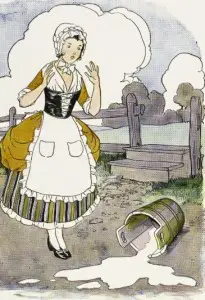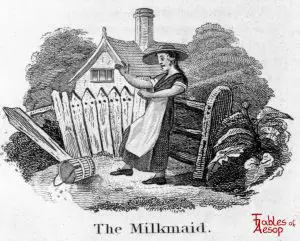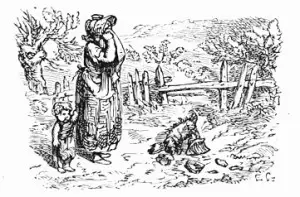A Milkmaid went to market with her pail on her head. She was lost in thought about the profits and what she will do with them and tripped. No more milk.
Do not count your chickens before they are hatched.

Aesop For Children
A Milkmaid had been out to milk the cows and was returning from the field with the shining milk pail balanced nicely on her head. As she walked along, her pretty head was busy with plans for the days to come.
“This good, rich milk,” she mused, “will give me plenty of cream to churn. The butter I make I will take to market, and with the money I get for it I will buy a lot of eggs for hatching. How nice it will be when they are all hatched and the yard is full of fine young chicks. Then when May day comes I will sell them, and with the money I’ll buy a lovely new dress to wear to the fair. All the young men will look at me. They will come and try to make love to me,—but I shall very quickly send them about their business!”
As she thought of how she would settle that matter, she tossed her head scornfully, and down fell the pail of milk to the ground. And all the milk flowed out, and with it vanished butter and eggs and chicks and new dress and all the milkmaid’s pride.
Moral
Do not count your chickens before they are hatched.

Jefferys Taylor
A MILKMAID, who poized a full pail on her head,
Thus mused on her prospects in life, it is said:
“Let’s see—I should think that this milk will procure
One hundred good eggs, or fourscore, to be sure.
“Well then—stop a bit:—it must not be forgotten,
Some of these may be broken, and some may be rotten;
But if twenty for accidents should be detach’d,
It will leave me just sixty sound eggs to be hatch’d.
“Well, sixty sound eggs—no; sound chickens, I mean;
Of these some may die;—we’ll suppose seventeen,—
Seventeen!—not so many—say ten at the most,
Which will leave fifty chickens to boil or to roast.
“But then there’s their barley: how much will they need?
Why they take but one grain at a time when they feed,
So that’s a mere trifle:—now then, let us see,
At a fair market price, how much money there’ll be?
“Six shillings a pair—five—four—three-and-six,
To prevent all mistakes, that low price I will fix;
Now what will that make?—fifty chickens, I said,
Fifty times three-and-sixpence—I’ll ask brother Ned.
“O! but stop—three-and-sixpence a pair I must sell ’em;
Well, a pair is a couple—now then let us tell ’em;
A couple in fifty will go—(my poor brain!)
Why just a score times, and five pair will remain.
“Twenty-five pair of fowls—now how plaguesome it is,
That I can’t reckon up such money as this!
Well, there’s no use in trying: so let’s give a guess;
I will say twenty pounds, and it can’t be no less.
“Twenty pounds, I am certain, will buy me a cow,
Thirty geese, and two turkeys—eight pigs and a sow;
Now if these turn out well, at the end of the year,
I shall fill both my pockets with guineas ’tis clear.
“Then i’ll [sic] bid that old tumble-down hovel good-bye;
My mother she’ll scold, and my sisters they’ll cry:
But I won’t care a crow’s egg for all they can say,
I shan’t go to stop with such beggars as they!”
But forgetting her burden, when this she had said,
The maid superciliously toss’d up her head:
When alas! for her prospects—her milk-pail descended!
And so all her schemes for the future were ended.
This moral, I think, may be safely attach’d;
Reckon not on your chickens before they are hatch’d.

Eliot/Jacobs Version
Patty the Milkmaid was going to market carrying her milk in a Pail on her head. As she went along she began calculating what she would do with the money she would get for the milk. “I’ll buy some fowls from Farmer Brown,” said she, “and they will lay eggs each morning, which I will sell to the parson’s wife. With the money that I get from the sale of these eggs I’ll buy myself a new dimity frock and a chip hat; and when I go to market, won’t all the young men come up and speak to me! Polly Shaw will be that jealous; but I don’t care. I shall just look at her and toss my head like this. As she spoke she tossed her head back, the Pail fell off it, and all the milk was spilt. So she had to go home and tell her mother what had occurred.
“Ah, my child,” said the mother, “Do not count your chickens before they are hatched.”

JBR Collection (The Maid and The Pail of Milk)
Dolly, the Milkmaid, having been a good girl for a long time, and careful in her work, her mistress gave her a Pail of New Milk for herself. With the Pail on her head, she was tripping gaily along to the house of the doctor, who was going to give a large party, and wanted the Milk for a junket. “For this Milk I shall get a shilling,” said Dolly, “and with that shilling I shall buy twenty of the eggs laid by our neighbour’s fine fowls. These eggs I shall put under mistress’s old hen, and if only half of the chicks grow up and thrive before the next fair time comes round, I shall be able to sell them for a good guinea. Then I shall buy that jacket I saw in the village the other day, and a hat and ribbons too, and when I go to the fair how smart I shall be! Robin will be there, for certain, and he will come up and offer to be friends again. I won’t come round so easily, though; and when he tries to kiss me, I shall just toss up my head and”—Here Dolly gave her head the toss she was thinking about. Down came the Pail, and the Milk ran out on the ground! Good-bye now to eggs, chicken, jacket, hat, ribbons, and all!

Townsend version
A farmer’s daughter was carrying her Pail of milk from the field to the farmhouse, when she fell a-musing. “The money for which this milk will be sold, will buy at least three hundred eggs. The eggs, allowing for all mishaps, will produce two hundred and fifty chickens. The chickens will become ready for the market when poultry will fetch the highest price, so that by the end of the year I shall have money enough from my share to buy a new gown. In this dress I will go to the Christmas parties, where all the young fellows will propose to me, but I will toss my head and refuse them every one.” At this moment she tossed her head in unison with her thoughts, when down fell the milk pail to the ground, and all her imaginary schemes perished in a moment.
[Note: This fable is similar to The Farmer’s Wife and The Raven.]


